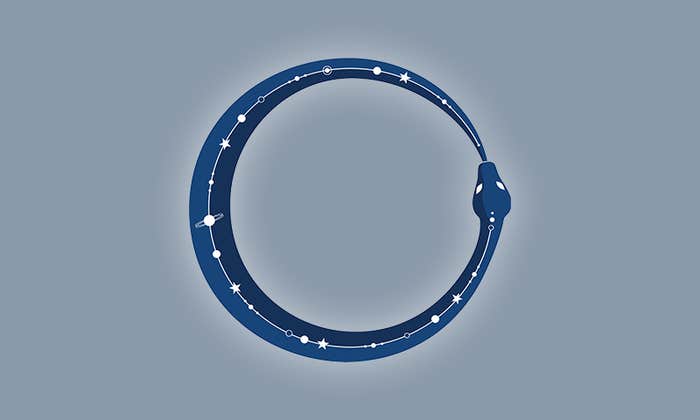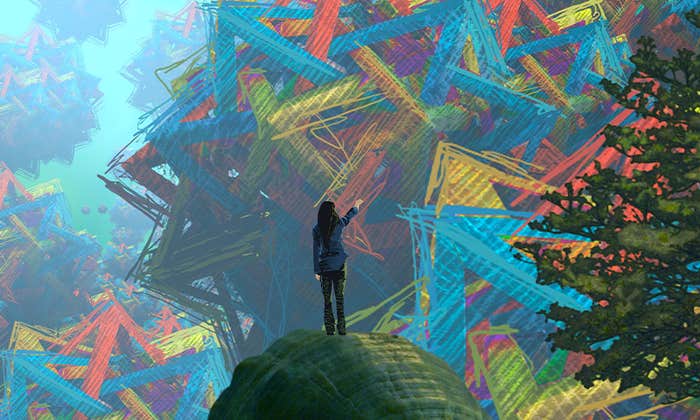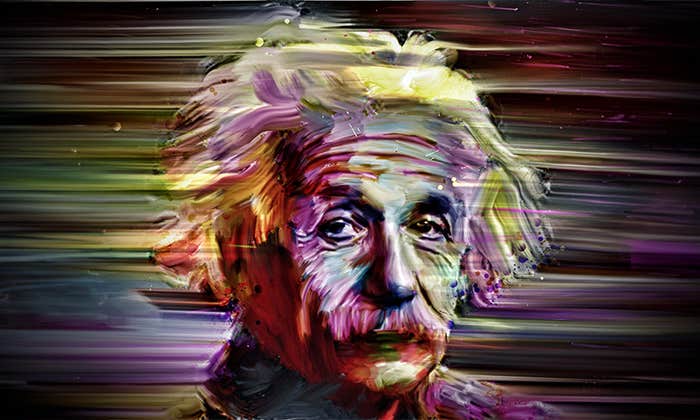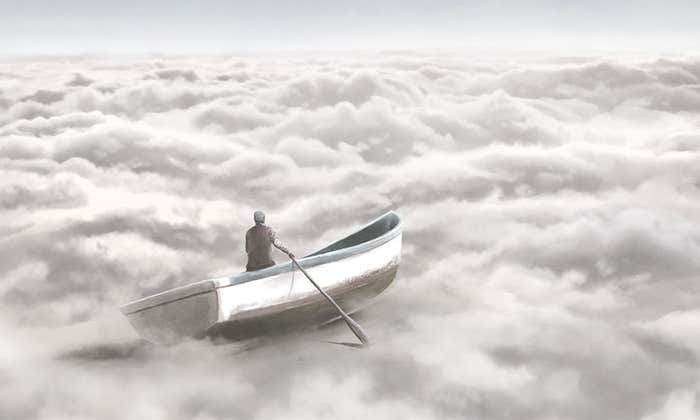When you are a hermit living alone in the Italian Alps, you monitor the weather. Snow means you can’t get groceries for a week. Rain will nourish the vegetable garden but also erode the hillside and send water into every crack in the roof. When the thunderstorms roll in, you get off the trail to avoid the lightning.
On a cold morning in May 2024, Johannes Schwarz stood on the narrow balcony of his hut, registering the clouds that filled the sky like cotton wool. It had rained all week and showed no sign of ceasing. Schwarz was a towering figure. He wore a beard down to his chest and a black fleece that covered the top half of his priestly robe.
In Schwarz’s previous life, the weather was an app on his phone that didn’t impact his daily life beyond telling him to grab an umbrella. Now it was a series of constantly changing realities that put him in touch with something that felt pure and elemental. The rain meant he would have to write inside all day and make do with the groceries he already had: For dinner he would pull apples and flour out of the storage room to make a tart.
Otherwise you just become another wild, bearded man who lives by himself in the forest.
For the past eight years, Schwarz, an Austrian priest of the Archdiocese of Vaduz in Liechtenstein, has spent part of the year in a hermitage on Monte Viso, a mountain wedged in the southwestern Italian Alps near the French border. Schwarz had come to live at the altitude of 3,900 feet to access a world removed from the clutter of daily life and parish responsibilities, one where he could pursue closer contact to the unseen. “Reality, if you really seek it out, will have answers about who we are, how we are, and what we are called to be,” wrote Schwarz from his desk adorned with portraits of Catholic saints.
On the mountain, Schwarz lives what he calls a “prayer life,” by which he does not mean that he prays all the time. To Schwarz, prayer means “raising your mind to God.” Gardening as prayer. Lecture notes as prayer. Meditation in the wooden chapel he built himself as prayer. “If you want to be a proper hermit, you have to live in relationship to God. Otherwise you just become another wild, bearded man who lives by himself in the forest,” Schwarz told me during my visit in May.
Schwarz estimated he still fell more on the side of wild, bearded man than enlightened hermit. But he was trying. He had given up many of the comforts of modern life—sofas, flat-screen TVs, constant connectivity—and taught himself how to build, plant, paint, write, and listen. Time up here was a slippery thing. He was 46, and he figured he had at least 20 more years—weather and health permitting—to better understand through devotional isolation the transitory nature of human existence and share what he found with others.
A sign outside the entrance to Schwarz’s tiny stone hut reads: “Eremo San Onofrio,” St. Onuphrius’ Hermitage. Onuphrius was a hermit in the Egyptian desert in the fourth or fifth century, one of the early Christian ascetics who went into the wild to attain hêsychia, or inner silence; he lived in the desert for 70 years, enduring extreme thirst and hunger, and is commonly depicted as a skeletal man with nothing but a long beard and a loincloth of leaves. None of this was a state that Schwarz originally aspired to. “When I became a priest 20 years ago, I would have never been able to tell you that one day I will live in a hut,” Schwarz said.
Schwarz grew up playing in the woods in the Austrian countryside outside the small city of Linz. As a child, he made maps tracing the creeks from their origin to where they entered the Danube River. He had to walk over a mile from his parents’ house to see friends and came from an outdoorsy family, with a great-grandmother who had hiked well into her 80s. He was only “nominally Catholic,” as he puts it, which was the same for most Austrians, and his family didn’t go to church.
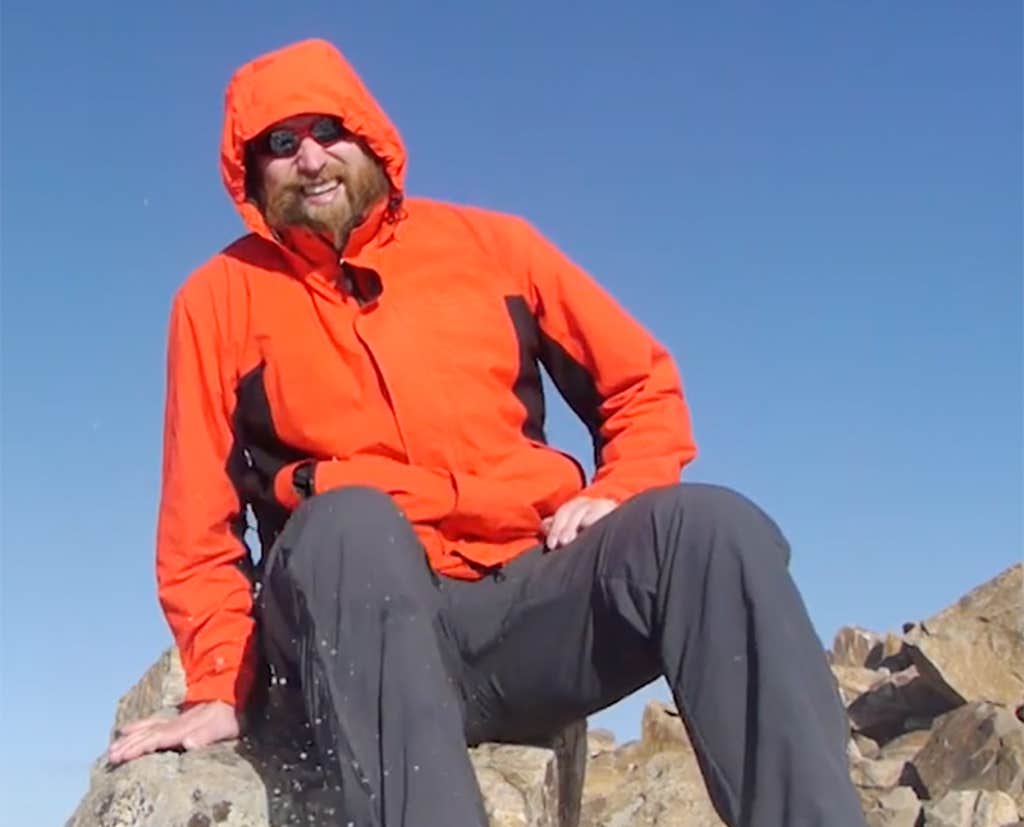
In 1990, Schwarz was 12, and the area around Linz was full of people exploring alternative ways to live: There were workshops on aura readings and finding energetic fields. Schwarz occasionally joined in: He remembers, for instance, walking unharmed over glowing coals as a teenager. He dabbled in environmentalism, donating to Greenpeace and the World Wildlife Fund. Next came the art of puppetry: Schwarz gave street performances across Europe. Then, when he was 16, a friend who was in what Schwarz calls “the alternative scene” invited him to accompany her to Rome and Umbria.
The Basilica of Santa Maria degli Angeli—glowing pink and white stones backed by Umbria’s green hills—was a wonder. Schwarz learned that St. Francis had personally rebuilt the tiny chapel inside the Basilica before he had interpreted the summons to “rebuild the church” as a metaphysical invocation; the idea moved Schwarz profoundly. He could almost see St. Francis’ fingerprints laying the mortar. It was in that chapel that Schwarz suddenly felt called to become a priest. He gave up other imagined prospective lives—painter, scientist, husband, father of five children—and enrolled at Austria’s International Theological Institute in the eastern Alps.
Every day I walk myself into a state of well-being and walk away from every illness. I have walked myself into my best thoughts, and I know of no thought so burdensome that one cannot walk away from it,” wrote the Danish theologian Søren Kierkegaard in 1847.
In 1998, while still a theology student, Schwarz walked more than 1,000 miles from Austria to the well-traveled Santiago de Compostela in Spain in a cloth robe, without money or a backpack, relying on the kindness of strangers. While walking, Schwarz found his attachment to comfort slipping away. First came the physical pain as the body adjusted to day-long movement. Then, as the pain faded, the mind wandered, processing memories and new encounters, slipping in and out of rumination. But after a few weeks, “the rhythm of your steps will slowly clear your mind,” wrote Schwarz. Eat, sleep, walk, repeat. He met people he would not have encountered otherwise and found them to be delightful. At some point, he stopped talking to himself—there was no internal voice or meta-commentary. This new reality was reflective and calm, like drifting in a lake. “Once you simply are, your hiking boots no longer matter,” he wrote. “You’ve started a journey inward. What will you find, or whom?” Schwarz returned to school, but the altered state of pilgrimage stayed with him; he longed to undertake future and more ambitious walks.
Reality, if you really seek it out, will have answers about who we are, and what we are.
In 2004, Schwarz became a priest, serving for nine years in a parish in peaceful, semi-rural Liechtenstein; for two of those years, he was the parish priest. But despite the bucolic surroundings, he didn’t enjoy the responsibilities of overseeing a budget or making spreadsheets. His creative self was untapped, and he was always running from one thing to the next. Also, being a priest was in a way too easy and therefore dissatisfying. There was a constant reinforcement of your role in a way that could boost an ego. “You will always have people who like what you’re doing and will always give you praise,” Schwarz explained. Although he wanted to serve in whichever capacity his Bishop ordered, in the parish he was restless.
In 2013, Schwarz took leave from work and trekked 8,680 miles on foot from Liechtenstein to Jerusalem, and made a documentary film about this journey, To Where God Dwells. He was inspired to film his pilgrimage after viewing the film Into Great Silence, which captures the lives of the Carthusian monks at the Grande Chartreuse, a monastery in the French Alps. In Israel, he encountered the sun-bleached Negev desert, an immense space where it was hard to glimpse a living thing. “Walking through the desert, I entered a world in which you could perceive silence,” Schwarz said. The vast space held a presence, like “the joy that comes with the presence of a lover.” It was as if he had suddenly entered a tent, he said, and inside the tent the atmosphere was different. He kept walking, but “the more immediate experience sort of never left me,” he said. “There is this beautiful St. Augustine quote that says the lover has the urge to sing … which I did, even though I’m not a singer, filling the desert with my voice as I walked through it.” Schwarz returned to his parish, but he wanted to continue to experience that spiritual expansion.
The Alps had long captivated Schwarz as both a place and a pilgrimage route, offering well-worn footpaths that other mystics, monks, and the spiritually inclined had trod. There was a history of people retreating into their slopes for protection or inquiry into the non-material world; down in the valley from Monte Viso were the remnants of the Waldensians, followers of an ascetic Christian movement that was excommunicated by the Roman Church in 1184 and had hidden out in the valley since the end of the 13th century. In 2016, Schwarz asked permission from his Archdiocese to withdraw from parish life in pursuit of his own projects—mostly writings, documentaries, or short films to translate religious concepts into modern parlance. After combing through different ranges for real estate, Schwarz found a property with a crumbling stone dwelling for under €20,000. There was something St. Franciscan in the idea of rebuilding a house rather than letting it dissolve.
In the 1950s, the English writer and adventurer Patrick Leigh Fermor absconded from the city to overcome writer’s block and stay in monasteries across Europe. In A Time to Keep Silence, a book of letters from his sojourn, Fermor wrote about the French Abbey of St. Wandrille, which allowed no speaking or smoking. “The period during which normal standards recede and the strange new world becomes reality is slow, and at first, acutely painful,” Fermor wrote. Yet after just a few days, he experienced a transformation in which his mind could focus on larger questions, while common emotions like fear and guilt dissipated. His work improved.
Schwarz’s transition into solitude was not painful like Fermor’s; it was like a slow realization of cultivating something that had been inside him all along. He carried what he’d gained from his experience as a pilgrim—physical labor, isolation, minimalism, and wilderness—onto the mountain. “It’s in losing yourself that you become who you truly are,” Schwarz said.
At the onset of his hermitage, Schwarz kept daily habits in order to not become aimless. He slept deeply, woke without an alarm, and began his days at 5 a.m. He constantly had to repair or build to keep the house stable and the gardens producing food, lit candles in the chapel, lined the walls with cork for insulation, carved icons, and painted religious iconography.
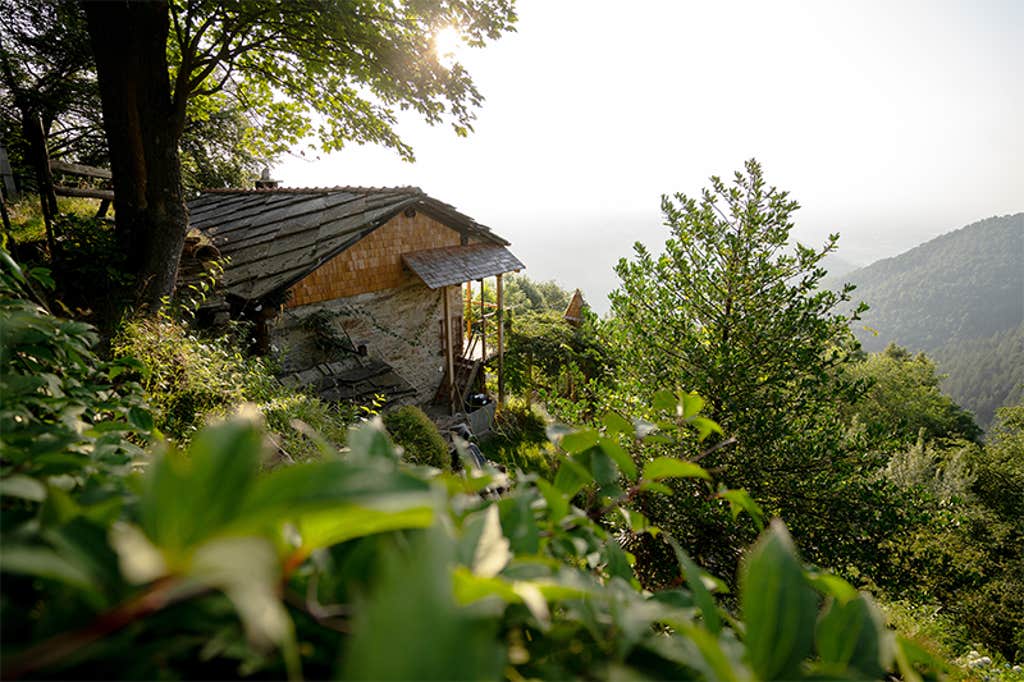
As Schwarz labored to restore the hut and worked on videos and books, he began to experience an ease that he had not had before. The days flowed one into another. In each task, there was a kind of pleasure. As a younger person, he would have blasted music while doing outside work, but here he didn’t want the distraction as he pushed stones into the steep hillside to create terraces that warm the soil. The mountain sharpened his hearing: What at first sounded like a depraved howl in the middle of the night Schwarz could soon identify as the cry of a wolf. He began to pay attention to smells of the herbs and grasses around him. “There is nothing in our mind that has not come in through the senses,” he said.
During periods of rest, Schwarz said his mind does not fill with to-do lists or replay conversations from the day before. Instead, he listens to the water rushing through swollen creeks full of melted snow, glimpses the pale green leaves unfolding from tree branches. Nature is not a mother to Schwarz—nature does not give him unconditional love—but, in the lineage of St. Francis, more like a sister, an entity to be respected. In the summer he sleeps with the balcony doors open, notes the return of frogs to the pond. He does not worry about money, because his living expenses are low, and his human interactions are occasional and fulfilling rather than constant and grating. He has a cell phone but forgets about it for long periods of time. The most stressful things Schwarz encounters are animals, like the chipmunks that slept under his stone slab roof for seven months of the year, woke up in the summer, and made a racket.
The hermitage has semi-removed Schwarz from the material world—although he still travels to give sermons, hosts visitors, and conducts local funerals when asked—but the internet connects him to it. In late 2023, he posted a series on YouTube about his life, One Year in the Life of a Part-Time Hermit. Schwarz wanted to share his insights, but he did not necessarily want to instruct others how to live. “I’m not suggesting you break out from your 9-5,” Schwarz says in one of the videos. “I simply propose that you choose to lead an extraordinary life. And you do not have to go anywhere to do that. I contend that a life is extraordinary only in as much as the ordinary things are done with an extraordinary amount of love.”
In his home on the mountain, Schwarz finds himself in conversation mostly with a Western religious and philosophical canon—one that includes Plato, St. Augustine, and Nietzsche. He reads the news and is troubled about the ongoing wars, but to him they also feel remote, symptoms of societies that have moved away from caring about deeper meaning and were focused on individual grievances.
His mind does not fill with to-do lists or replay conversations from the day before.
“We have to look beyond the physical—to what is therefore called metaphysical,” he said. “Without metaphysics, all that is left is politics. And politics devoid of the right metaphysics—for all the good desires, hopes, and dreams of man—leads in the end to a very earthly hell.”
Schwarz, who at one point wanted to be a marine biologist, is an advocate of the scientific method, but he faults modern science with replacing the most critical questions—“What is the meaning of life?” “What is our purpose here on Earth?”—with mundane questions such as “How do objects work?” In his view, post-Enlightenment thinking had led to the subjugation of nature on a grand scale, and materialism and naturalism are ideological positions that draw on a story about the world that was not true. Not everything real can be quantified.
“Reality, if anything, is something we discover,” Schwarz said: a gift you could remain open to. He still goes on strenuous pilgrimages, which he feels are essential in whittling down existence, taking him even closer to its core. You cannot access inner stillness through reading an article about it, and perhaps, Schwarz wondered, it would have been better to say nothing at all. And, although he is often able to access hêsychia, an inner silence, he is still interrogating his purpose on Earth. Was fleeing society a way for him to escape his own weaknesses and failings? Is he getting closer to God, or evading his duties as a priest?
The more Schwarz puts down roots in the Alps—he has recently built a deck and a walipini greenhouse, which is dug into the ground—the more he becomes aware of the temporary nature of the physical reality that surrounds him. It is at times a contradictory thing to explain. He has grown attached to the property and the birds, misses the smell of wet earth when he travels—yet increasingly sees himself as merely a custodian of the land, one who would soon leave this world for the next. Schwarz recently re-tiled his roof, choosing tiles that would last for 35 years, until he turns 81. From his vantage point, it is not so far off. “The past five years almost feel like a blink,” Schwarz said. Although the dragonflies were only hatching, he knew that soon the chestnuts would fall and he would roast their soft centers in the small wood stove during winter nights.
Unlike his desert pilgrimage, the mountain hermitage has a physical structure, but it still feels somewhat like that spiritually expansive tent where Schwarz could see things from an altered perspective. The desert and the mountain are connected: They offer a way to be in between this world and the next. “We need to understand ourselves as pilgrims passing through,” Schwarz said. ![]()
Lead image courtesy of Johannes Schwarz



























